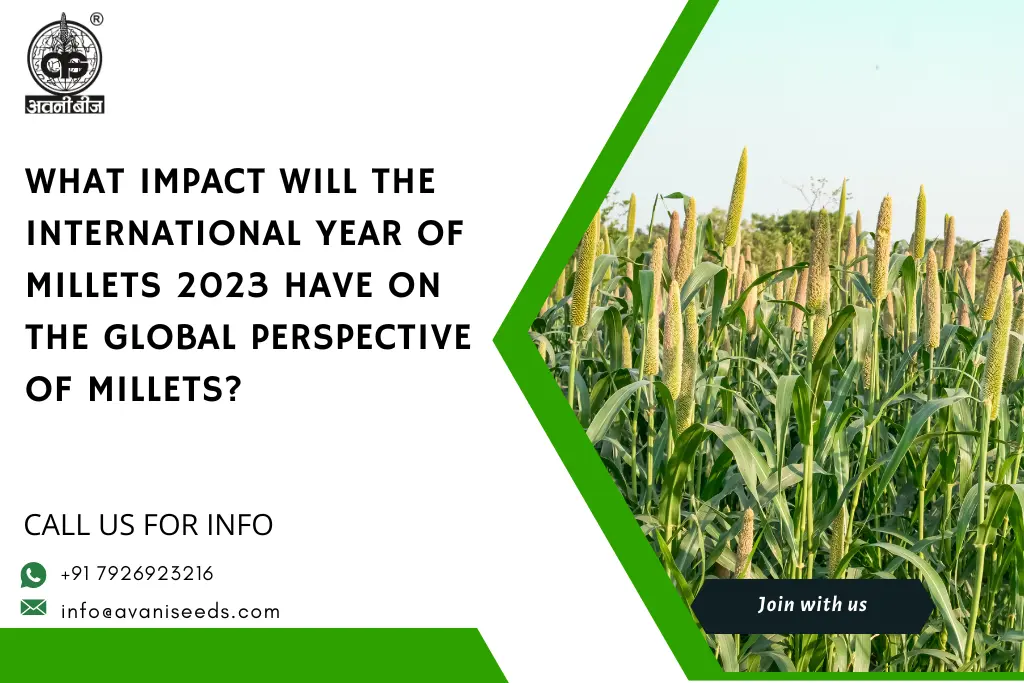Before we proceed, let us know about the International Year of Millets first. The International Year of Millets is an initiative that was proposed by India and approved by the Food and Agriculture Organization (FAO) in 2018. The United Nations General Assembly has declared the year 2023 as the International Year of Millets, following a resolution adopted with support from over 70 nations. The objectives of this initiative are to raise awareness of the significant contribution of millets to food security and nutrition, inspire stakeholders to improve sustainable production and quality of millets, and focus on enhanced investment in research and development, and extension services to achieve the other two aims.
The International Year of Millets aims to promote the cultivation and consumption of millets, which are highly nutritious grains that have been an important part of traditional diets in many parts of the world. Through this initiative, the importance of millets as a source of food security and nutrition will be highlighted, which can lead to increased demand for these grains and consequently benefit farmers who grow them.
Furthermore, the International Year of Millets will also encourage research and development efforts aimed at improving the sustainability of millet production and quality. With enhanced investment in research and development and extension services, stakeholders can work towards developing improved millet varieties, increasing yields, and developing sustainable production systems that can benefit farmers and consumers alike.
Now, what is millet?
Millet refers to a group of small-seeded annual grasses that are primarily grown as grain crops on marginal lands in dry areas of temperate, subtropical, and tropical regions. In India, some common millets are Finger millet (Ragi), Sorghum (Jowar), Little millet (Sama), Pearl millet (Bajra), and Proso millet (Variga). These grains have been cultivated for food since ancient times, with evidence found in the Indus civilization. Today, millet is grown in about 131 countries and is the traditional food for approximately 600 million people in Asia and Africa. India is the world’s largest producer of millet, accounting for 20% of global production and 80% of Asia’s production.
Impact and why is it important for India?
The International Year of Millets 2023 has the potential to bring about significant changes in the global perspective of millets. Millets are primarily grown during the kharif season in rainfed areas as they require less water and agricultural inputs than other cereals. The production of millets has great potential to generate livelihoods, increase farmers’ income, and ensure food and nutritional security not only in India but also in other parts of the world. However, unless consumption is increased, the demand for millets will not be generated to motivate farmers to shift to millets.
The International Year of Millets aims to raise awareness of the nutritional benefits of millets and promote their consumption, particularly in India, where millets have been an integral part of traditional diets. Increased consumption of millets can improve people’s health as they contain many nutrients and minerals crucial for the human body. Millets are rich in dietary fibre, which helps control blood pressure and sugar levels.
Moreover, the International Year of Millets can inspire stakeholders to invest in research and development to improve the sustainability and quality of millet production. With enhanced investment, farmers can develop improved millet varieties, increase yields, and develop sustainable production systems that can benefit farmers and consumers alike.
Conclusion:
To sum up everything, the International Year of Millets 2023 is a significant initiative that aims to raise awareness of the nutritional benefits of millets and promote their consumption globally. Millets have been an integral part of Indian traditional diets and have the potential to generate livelihoods, increase farmers’ income, and ensure food and nutritional security in India and other parts of the world. The initiative can inspire stakeholders to invest in research and development to improve the sustainability and quality of millet production, leading to increased yields and sustainable production systems. Overall, the International Year of Millets 2023 can bring about a positive impact on the global perspective of millets, promoting their adoption as a sustainable and nutritious food source.
Avani Seeds Limited is a well-known market leader in the millet distribution and production sectors. The business has established a position for itself in the agricultural industry because of a strong dedication to quality and innovation. They have established a solid reputation among farmers, dealers, and customers by specializing in millet.
Avani Seeds set out with the intention of revolutionizing millet farming, and today they are renowned for their persistent search for excellence. In addition to producing premium millet goods, Avani Seeds Limited also acts as a trusted distributor, ensuring that these nourishing grains are distributed to consumers everywhere.
Avani Seeds Limited stands out as a pioneer in the millet sector in a world where the value of wholesome and sustainable food is expanding. They are an important component in the world’s agricultural system due to their dedication to quality and their involvement in delivering healthful, environmentally friendly millet products.



